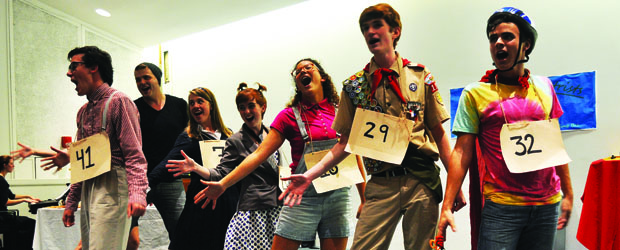Laughter, cheers and a plethora of lively characters filled Oliva Hall as nine Conn students took the stage in Wig & Candle’s production of Rachel Sheinkin and William Finn’s The 25th Annual Putnam County Spelling Bee from October 18 to 20. The show was directed and choreographed by Christophe Desorbay ’15 and Terilyn Eisenhauer ’15. Anatasia Elliott ’14 directed the music while Madison Winey ’15 served as stage manager.
Through about twenty musical numbers, Spelling Bee tells the story of six adolescent misfits who aspire to win Putnam County’s spelling bee. The musical opens with Rona Lisa Peretti, played by Brittany Baltay ’16, who in a mother/school teacher-like way introduces the six main contestants in the musical’s title number. The audience quickly gets acquainted with each character’s idiosyncrasies: Leaf Coneybear’s (Jake Faris ’15) hyperactive personality in which he must wear a helmet, Marcy Park’s (Molly Shimko ’13) ability to speak not five, but six languages as expressed in “I Speak Six Languages,” Olive Ostrovsky’s (Skyler Volpe ’13) ability to rearrange words to spell new things, Logainne Schwartzandgrubenierre’s (Taryn Kitchen ’16) passion for political reform, Chip Tolentino’s (David Socolar ’16) participation in a boy scout troupe and William Barfée’s (Patrick Landes ’16), talent for spelling out words with his foot as demonstrated in “Magic Foot.”
The adults in the musical also express their own quirks. There’s Vice Principal Douglas Panch’s (Cian Fields ’16) mysterious five-year hiatus. Even though Panch claims that he is “in a better place now,” he later erupts on stage when Olive’s dad calls his daughter on the phone, interrupting the spelling bee. The bee’s comfort counselor, Mitch M. Mahoney, played by Grant Jacoby ’13, is an ex-convict. Jacoby clearly showed Mahoney’s initial dissatisfaction with his job through distinct side comments and facial expressions as he handed the losers a juice box while sometimes receiving a hug.
As the musical progresses through series of definitions, pronunciations and in-context sentences featuring words like “acouchi,” “lugubrious” and “camouflage,” friendships and enmities are formed among the spellers. While Barfée develops a friendship with Olive, a first-time speller, he forms a loathing relationship with Chip. The audience learns of Panch’s lasting infatuation with Ms. Peretti, to which she does not return his affections.
Perhaps one of the most enjoyable aspects of Spelling Bee is how it pokes fun at the awkwardness of adolescence while honing on the pressures of striving for “perfection.” Although many of the characters have exaggerated personalities, they reveal some very real emotions. Leaf and Olive each suffer from non-supportive families. Faris comically portrayed Leaf’s visible goofiness while also showing his underlying lack of confidence through “I’m Not That Smart.” Volpe showed Olive’s determination to succeed in musical numbers like “My Friend, the Dictionary,” as well as her inner sadness and frustration with her absent mother in “The I Love You Song.”
Marcy and Logainne, on the other hand, have the opposite problem; they must over-perform to please their demanding parents. Throughout the musical, Shimko depicted Marcy’s rigid and strict personality until she realizes, with Jesus’ help, that she does not have to “live up to expectations.” Kitchen captured Logainne’s youthfulness (she is the youngest competitor in the bee) and her determination to please her two dads (Faris and Jacoby) through her lisped singing of “Woe is Me.” At the same time, Kitchen showed how Logainne feels morally divided when her competition-hungry father, also played by Faris, spills soda on the floor to prevent Barfée from using his “magic foot.”
While the characters’ underlying anxieties definitely play a huge role in the musical, their comedic sides are not lost at all; the fact that Spelling Bee focuses on adolescents makes it even funnier. Chip Tolentino’s self-discovery after he develops a crush on Leaf’s sister, Marigold, causes him to lose the bee. Socolar hilariously depicted Chip’s inconvenient situation as he is forced to spell the word “tittup,” only making his erection worse. Socolar continued to portray Chip’s disappointment as he sings “My Unfortunate Erection (Chip’s Lament),” while tossing candy at various areas of the audience.
Chip’s enemy during the bee, William Barfée, also had the audience’s attention during his musical numbers and interactions with the other spellers. Landes’s captured Barfée’s awkward walk and congested voice in a comedic way without overplaying it. Landes’s repeated line, “It’s pronounced Bar-FAY, not Barf-ee,” in response to Panch and Ms. Peretti’s mispronunciation of the character’s last name, seemed to never get old as the audience laughed every time.
Spelling Bee also showed the Conn community how multifaceted its actors and singers are. Many of the actors in the musical played various other roles too. Baltay and Jacoby played Olive’s parents, harmonizing perfectly in the “I Love You Song” before quickly returning to their main parts. The whole cast, including the three or four spellers from the audience who were selected shortly before the show, acted as Leaf’s family. Socolar descended from stage left in a white toga-like robe when he played Jesus Christ. Everyone stepped outside of the confines of their main roles in the highly energetic number, “Pandemonium,” to throw papers, dance around and toss chairs. Much later, they stepped back into their roles in “The Last Goodbye.”
Although Spelling Bee has ended, I am sure it will still be talked about well after this week. The cast’s fresh take on the roles, the band’s upbeat accompaniment and the work of the crew have shown the Conn community that great productions can happen through strong student involvement and determination.










